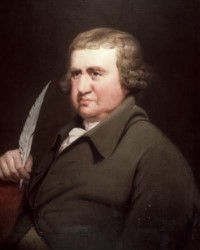Erasmus Darwin educated at the universities of Cambridge (1750—54) and Edinburgh (1754—56), Darwin opened a successful medical practice in Lichfield after finding prospects in Nottingham unpromising. He soon built a reputation as a practitioner of such talent that George III offered him a position as his personal physician in London. Darwin declined to make the move, however. While in Lichfield, he made the acquaintance of many distinguished men, among them Joseph Priestley, Jean-Jacques Rousseau, and Samuel Johnson.
Following his move to Derby (1781), where he founded a philosophical society, he opened a dispensary at Lichfield (1784). A freethinker and radical, Darwin often wrote his opinions and scientific treatises in verse. The most notable of these works are The Botanic Garden (1794—95) and The Temple of Nature or the Origin of Society (1803). In Zoonomia or the Laws of Organic Life (1794—96) he advanced his own concepts of evolution, which were similar to those of Jean-Baptiste Lamarck. He believed that species modified themselves by adapting to their environment in a purposive way. It is as a transitional figure that Erasmus Darwin is primarily important. He embodied the attitudes and values of 18th-century materialism, but his conclusions concerning evolution were drawn from simple observation and were rejected by the more sophisticated of the 19th-century scientists, his grandson Charles foremost among them. His major works also include A Plan for the Conduct of Female Education in Boarding Schools (1797) and Phytologia, or the Philosophy of Agriculture and Gardening (1800).
Excerpt from The Botanic Garden:
“E’en round the Pole the flames of love aspire,
And icy bosoms feel the secret fire,
Cradled in snow, and fanned by Arctic air,
Shines, gentle borametz, thy golden hair;
Rooted in earth, each cloven foot descends,
And round and round her flexile neck she bends,
Crops the grey coral moss, and hoary thyme,
Or laps with rosy tongue the melting rime;
Eyes with mute tenderness her distant dam,
And seems to bleat—a vegetable lamb.”
